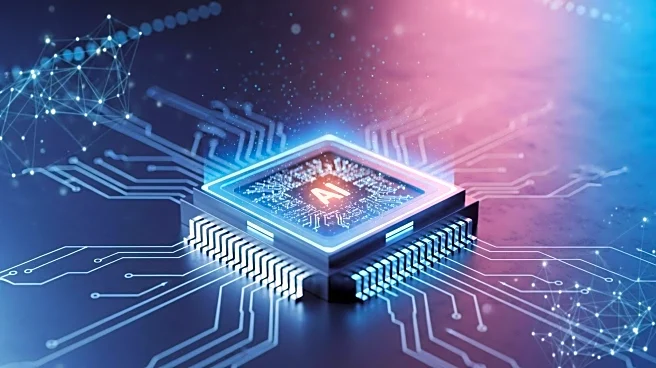What's Happening?
Broadcom has introduced a new AI network chip named Thor Ultra, designed to compete with Nvidia's offerings in the AI data center market. Despite this launch, Broadcom's stock experienced a decline of over 3%. The Thor Ultra chip is the industry's first 800G AI Ethernet network interface card, aimed at large-scale AI data centers with over 100,000 XPUs. It supports data speeds of 800 gigabits per second, facilitating the deployment and operation of large AI models. Broadcom's senior vice president, Ram Velaga, emphasized the chip's performance, scalability, and interoperability, which are crucial for future AI clusters.
Why It's Important?
The introduction of the Thor Ultra chip marks a significant advancement in AI networking technology, potentially reshaping the competitive landscape in the AI data center market. By challenging Nvidia, Broadcom aims to capture a share of the lucrative AI chip market, which is projected to reach $60 billion to $90 billion by 2027. This development could lead to increased competition, driving innovation and potentially lowering costs for data center operators. Broadcom's strategic partnership with OpenAI to roll out custom chips further positions the company as a key player in the AI industry.
What's Next?
Broadcom's collaboration with OpenAI to deploy custom chips starting in 2026 indicates a long-term commitment to expanding its presence in the AI sector. The company may continue to innovate and develop new technologies to enhance its competitive edge against Nvidia and other rivals. Industry stakeholders will likely observe how Broadcom's Thor Ultra chip performs in real-world applications and its impact on the company's market share and revenue growth. The success of this chip could influence future investments and partnerships within the AI and semiconductor industries.
Beyond the Headlines
Broadcom's launch of the Thor Ultra chip reflects the growing importance of AI technology in shaping the future of data centers and computing infrastructure. As AI applications become more prevalent, the demand for high-performance networking solutions will increase, driving further advancements in chip technology. This development also highlights the strategic importance of partnerships between technology companies and AI developers, as they collaborate to create solutions that meet the evolving needs of the industry.









